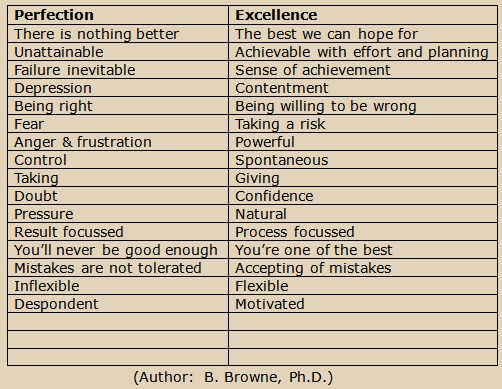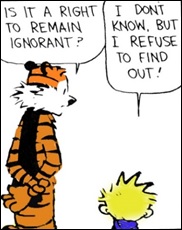Worry Well
December 31st, 2014

SURPRISINGLY, WORRYING SOMETIMES IS HELPFUL…
Most of us worry at least some of the time. We can’t help it. From ‘Will I be late?’ to ‘Did everyone hate the meal I cooked?’ to ‘Am I going to get the sack?’ it’s possible to worry about pretty much anything. And some of us worry more than we are comfortable with and that too we cannot help.
Living a worry-free life is often seen as a desirable—and achievable—goal. But, according to experts, not only is it unreasonable to eradicate all worry, if we did so, we could miss out.
‘We can’t expect to rid ourselves entirely of worry,’ says psychotherapist Andrea Perry. ‘Far better to recognize it as the healthy life force it is. I think it’s important, because if we see anxiety or worry as the enemy, then we want to push it away, stamp it out, get rid of it. But if we see it as telling us something, and we can use it to find ways to take better care of ourselves, that’s far more useful.’
So, how can we better understand our worry, and learn to use it to our advantage? ‘The price we pay for being able to think about the future is to know that we are mortal, and to know we are vulnerable,’ says Dr Martin Rossman, author of The Worry Solution. Our worries are rarely about what is happening right now, in the present moment. If we stop to examine them, we can see that they are about the prospect of some kind of future calamity. What if you are running late? Will your friends be angry with you, disown you, will you be left alone? What if you lose your job? Will you end up penniless and homeless?
‘Worry is often described as an allergy to uncertainty,’ says Dr Kevin Meares, consultant clinical psychologist for the Northumberland Tyne and Wear NHS Foundation Trust. ‘For a worrier, only small amounts of doubt are required to set off a large amount of worry,’ he says. ‘If you try to live your life by limiting uncertainty, you end up in a difficult place. You become controlled by routine.’
‘I used to feel terribly anxious about going to new places, in case I got lost or turned up late, so I’d make extremely detailed maps and lists of directions, and always leave at least an hour earlier than I needed to,’ says Theresa, 42. ‘Even then, if there were a traffic jam I’d get panicky and stressed, so I started to avoid going to new places altogether. It wasn’t until my partner pointed out how difficult this was for him that I decided to see a counsellor.’
One of the reasons we find it so difficult to worry less (no matter how much our exasperated loved ones may plead with us to let it go or that it doesn’t help) is that it can give us a kind of comfort. ‘There are psychological rewards for worrying, even when we worry about the things we can’t change,’ says Rossman. ‘Worrying about something can partially satisfy a sense that we are controlling or doing something about whatever is worrying us.’ And when your most worrying predictions fail to come true, it’s tempting to think it’s all down to you.
‘The brain may interpret the connection between the worrying and the fact that the event never materialized as evidence we are exerting some kind of control over the situation,’ says Rossman. ‘It’s easy to see how this kind of “successful” worry can lead us to an irrational yet powerful feeling that we can fend off undesirable events.’
The upside of worrying

Although most of us are aware of the problems worry can cause, we may not realize it can have benefits, too. ‘It’s a good way of thinking rapidly about problems and solutions,’ says Meares. Worriers like to be prepared. They will over-rehearse presentations, they will double check everyone has their passport, they will never be without a map or an emergency fund.
For this reason, worriers can be valuable people to have around. ‘The question is, how do you use your anxiety?’ says Perry. ‘Do you use it to make effective choices or does it completely deactivate you? If, for example, it makes you feel you’re not good at your job and you push yourself hard to compensate, then your employer may get fantastic work from you.’
Perry also points out that worriers are like ‘canaries in a coal mine’ – they foresee problems that others don’t. While researching her book on claustrophobia, she spoke to many sufferers who felt anxious about taking the Eurostar train from London to Paris. ‘Then, when a train broke down in the tunnel and people were trapped for 12 hours, the authorities said they’d had no way of preparing for something like that to happen,’ she says. ‘Anyone with claustrophobia could have predicted a train breaking down and people being trapped. In some circumstances, we need those people who have taken every care to make sure the worst doesn’t happen.’
This doesn’t mean that your worry, however productive it makes you, feels any less stressful. But taking time to consider the benefits, as well as the ways you can manage your feelings of uncertainty and anxiety better, is an important first step in learning how to worry well. The goal is not to stamp out worrying, it’s about changing the way you react. It is important to learn to begin to move away from the content of the worry and think about the underlying process.
A tool for self-knowledge
And if we can do this, we come to one of the most useful functions of worry—the insights it can give us to our subconscious thoughts. ‘We all worry about the things that are important to us – our aspirations – and our worry improvises around those aspirations,’ says Meares. ‘For example, someone may say they’re worried about being late for a meeting. When that person explores that worry further, they realize that they are worried about appearing indifferent to their commitment. Understanding what goals drive our worry appears to be an important step in overcoming it.
This can also help us evaluate what is important to us.’ In the case of the individual who is worried about being late for the meeting, he discovered that what is important to him the value of his reputation and wanting to be a person of integrity. Meares often uses the cognitive behavioral therapy technique of the downward arrow (look for the Downward Arrow Technique that I’ve also posted in my Reflections page) to help individuals examine their thoughts. “In this way, worry can be an important tool for self-knowledge,” he says.
If you want to get to grips with it, the first step is to determine whether your worry has a real solution. Talking to trusted friends or a professional counsellor could help. But perhaps the most important thing to remember is that there’s a place for worrying in everyone’s life. We can reduce it, but none of us can stamp it out completely. And we may well become a stronger, more capable person if we can learn to use it to our advantage.
If we are going to worry – and let’s face it, we are – we might as well learn to worry well.
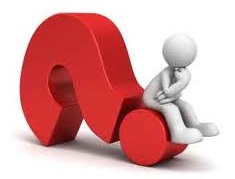
Dare To Dream
December 31st, 2014
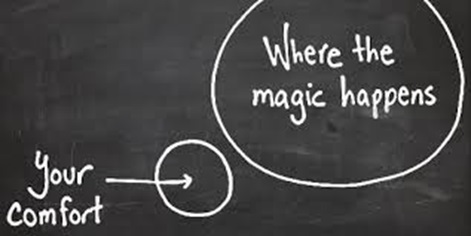
Until one is committed there is hesitancy, the chance to draw back, always ineffectiveness. Concerning all acts of imitative or creation, there is one elementary truth…that the moment one definitely commits oneself, then Providence moves too. All sorts of things occur to help one that would otherwise never have occurred. A whole stream of events issues from the decision, raising in one’s favor all manner of incidents and meetings and material assistance which no man would have believed would have come his way.
Whatever you think you can do or believe you can do, begin it. Action has magic, grace, and power in it.
(W.H. Murray The Scottish Himalayan Expedition)

Having Thoughts versus Real Thinking
December 31st, 2014

“I find for myself that my first thought is never my best thought. My first thought is always someone else’s; it’s always what I’ve already heard about the subject, always the conventional wisdom.
It’s only by concentrating, sticking to the question, being patient, letting all the parts of my mind come into play that I arrive at an original idea, by giving my brain a chance to make associations, draw connections, take me by surprise.
And often even that idea doesn’t turn out to be very good.
I need to think about it, too, to make mistakes and recognize them, to make false starts and correct them, to outlast my impulses, to defeat my desire to declare the job done and move onto the next thing.”
William Deresiewicz, former professor of English at Yale, in his lecture to the United States Military Academy at West Point in October of 2009
A Love Letter to You from Me, Your Creator
July 12th, 2014

Dearest Everyone,
I am sending you this love letter because I want you to know the principles of life upon which the world stands. It is important that you know that I make no exceptions to my own principles of conduct nor to the laws of nature that ensure that the sun rises (poetically speaking), or that day follows night, or that rocks are hard and rain is wet.
- I make no exceptions. I’m sorry if you find that disappointing, but imagine if I did make exceptions. For whom would I make the exceptions? Would it be for those of you who behave well? Please, if you tell the truth, you are only doing that to avoid punishment or to get a reward. Would it be for those of you who make big donations? If you tell the truth, that is for your own self-satisfaction. Would it be to those of you who give me your prayers of repentance? Give those prayers of repentance to your brothers and sisters, to your friends and acquaintances, to the strangers you step over and ignore. I don’t need those. I don’t hold grudges.
- Regarding gravity: count on it. Don’t expect to jump off a roof and float…and don’t say I didn’t warn you.
- Regarding the weather: it’s unpredictable. If you don’t like that, don’t become a farmer. Try being a dermatologist: it pays more and the hours are better.
- No matter how much I love you and how adorable you are, remember to wear gloves when it’s freezing outside. Take my word about this because if you don’t you’ll get frostbite. Just because you’re cute and a good person doesn’t mean I’ll make an exception.
And, in case you think I’ll treat scoundrels and murderers any differently you are wrong…if they wear gloves outside when it’s cold, they won’t get frostbite (even if you think they deserve it). - If you want to reap apples, make sure you have planted apple seeds. You will not get oranges from planting apple seeds no matter how much you’d like me to change my mind. Be sure to take the seeds out of your pocket, bend down, do a little digging and plant them. I did my part by providing the earth, the sun, the rain, and the seeds…not to mention providing you with the miracle of transformation and if you think that was easy, think again. You try it. It’s pretty tricky. And also,
- If it isn’t raining use a garden hose. And if you don’t have a garden hose, keep thinking of solutions. I gave you a brain with the capacity to create infinite solutions for infinite problems.
- Read points 5-7 again…I’m not just talking about gardening…I’m talking about relationships and anything else that is important to you and that you value.
- If you get angry, it’s because you think you are entitled to have something you don’t have, or you think someone should be some other way. Remember the Flood? Now, that was anger so I know what I’m talking about. The rainbow afterwards was just to let you know I came to my senses and I would never do that again. After all, I created you with free will, so who am I to get upset when you do something I don’t like? Of course, I have my preferences. who doesn’t? After all, wouldn’t you prefer to see your children content than miserable?
- Speaking of being miserable, I’m not going to rescue you from the misery you brought upon yourself. That doesn’t mean I don’t have compassion for you…it does mean, as the sign says in the china shop, “You broke it, you buy it. It’s yours.” Sometimes the best way to rescue you is to let you sit with your choice…it helps you get the consequences into your bones so when faced with a similar situation you are more likely to make a different choice.
- Regarding death, yours is certain. You will not be the exception. Even Jesus died. Even though you won’t know when you’re going to die or how you’re going to die, it will happen. Having said that, take my advice…it’s still a good idea to wear your seatbelt and respect the speed limits.
- Everything you need to know about life can be found in the driver’s handbook that is issued by your state. I’ll send you more about that in my next letter to you.
- Remember, you are never alone. Nope, never.

10 Painfully Obvious Truths Everyone Forgets Too Soon
June 14th, 2014
THE TRUTH DOES NOT CEASE TO EXIST WHEN IT IS IGNORED
1.The average human life is relatively short
We know deep down that life is short, and that death will happen to all of us eventually, and yet we are infinitely surprised when it happens to someone we know. It’s like walking up a flight of stairs with a distracted mind, and misjudging the final step. You expected there to be one more stair than there is, and so you find yourself o ff balance for a moment, before your mind shifts back to the present moment and how the world really is. LIVE your life TODAY! Don’t ignore death, but don’t be afraid of it either. Be afraid of a life you never lived because you were too afraid to take action. Death is not the greatest loss in life. The greatest loss is what dies inside you while you’re still alive. Be bold. Be courageous. Be scared to death, and then take the next step anyway.
2. You will only ever live the life you create for yourself
Your life is yours alone. Others can try to persuade you, but they can’t decide for you. They can walk with you, but not in your shoes. So make sure the path you decide to walk aligns with your own intuition and desires, and don’t be scared to switch paths or pave a new one when it makes sense. Remember, it’s always better to be at the bottom of the ladder you want to climb than the top of the one you don’t. Be productive and patient. And realize that patience is not about waiting, but the ability to keep a good attitude while working hard for what you believe in. This is your life, and it is made up entirely of your choices. May your actions speak louder than your words. May your life preach louder than your lips. May your success be your noise in the end. And if life only teaches you one thing, let it be that taking a passionate leap is always worth it. Even if you have no idea where you’re going to land, be brave enough to step up to the edge of the unknown, and listen to your heart.
3.Being busy does NOT mean being productive
Busy-ness isn’t a virtue, nor is it something to respect. Though we all have seasons of crazy schedules, very few of us have a legitimate need to be busy ALL the time. We simply don’t know how to live within our means, prioritize properly, and say no when we should. Being busy rarely equates to productivity these days. Just take a quick look around. Busy people outnumber productive people by a wide margin. Busy people are rushing all over the place, and running late half of the time. They’re heading to work, conferences, meetings, social engagements, etc. They barely have enough free time for family get-togethers and they rarely get enough sleep. Yet, emails are shooting out of their smart phones like machine gun bullets, and their day planners are jammed to the brim with obligations. Their busy schedule gives them an elevated sense of importance. But it’s all an illusion. They’re like hamsters running on a wheel. Though being busy can make us feel more alive than anything else for a moment, the sensation is not sustainable long term. We will inevitably, whether tomorrow or on our deathbed, come to wish that we spent less time in the buzz of busyness and more time actually living a purposeful life.
4. Some kind of failure always occurs before success
Most mistakes are unavoidable. Learn to forgive yourself. It’s not a problem to make them. It’s only a problem if you never learn from them. If you’re too afraid of failure, you can’t possibly do what needs to be done to be successful. The solution to this problem is making friends with failure. You want to know the difference between a master and a beginner? The master has failed more times than the beginner has even tried. Behind every great piece of art is a thousand failed attempts to make it, but these attempts are simply never shown to us. Bottom line: Just because it’s not happening now, doesn’t mean it never will. Sometimes things have to go very wrong before they can be right.
5. Thinking and doing are two very different things
Success never comes to look for you while you wait around thinking about it. You are what you do, not what you say you’ll do. Knowledge is basically useless without action. Good things don’t come to those who wait; they come to those who work on meaningful goals. Ask yourself what’s really important and then have the courage to build your life around your answer. Remember, if you wait until you feel 100% ready to begin, you’ll likely be waiting the rest of your life.
6. You don’t have to wait for an apology to forgive
Life gets much easier when you learn to accept all the apologies you never got. The key is to be thankful for every experience – positive or negative. It’s taking a step back and saying, “Thank you for the lesson.” It’s realizing that grudges from the past are a perfect waste of today’s happiness, and that holding one is like letting unwanted company live rent free in your head. Forgiveness is a promise—one you want to keep. When you forgive someone you are making a promise not to hold the unchangeable past against your present self. It has nothing to do with freeing a criminal of his or her crime, and everything to do with freeing yourself of the burden of being an eternal victim.
7. Some people are simply the wrong match for you
You will only ever be as great as the people you surround yourself with, so be brave enough to let go of those who keep bringing you down. You shouldn’t force connections with people who constantly make you feel less than amazing. If someone makes you feel uncomfortable and insecure every time you’re with them, for whatever reason, they’re probably not close friend material. If they make you feel like you can’t be yourself, or if they make you “less than” in any way, don’t pursue a connection with them. If you feel emotionally drained after hanging out with them or get a small hit of anxiety when you are reminded of them, listen to your intuition. There are so many “right people” for you, who energize you and inspire you to be your best self. It makes no sense to force it with people who are the wrong match for you.
8. It’s not other people’s job to love you; it’s yours
It’s important to be nice to others, but it’s even more important to be nice to yourself. You really have to love yourself to get anything done in this world. So make sure you don’t start seeing yourself through the eyes of those who don’t value you. Know your worth, even if they don’t. Today, let someone love you just the way you are – as flawed as you might be, as unattractive as you sometimes feel, and as incomplete as you think you are. Yes, let someone love you despite all of this…AND LET THAT SOMEONE BE YOU.
9. What you own is not who YOU are
Stuff really is just stuff, and it has absolutely no bearing on who you are as a person. Most of us can make do with much less than we think we need. That’s a valuable reminder, especially in a hugely consumer-driven culture that focuses more on material things than meaningful connections and experiences. You have to create your own culture. Don’t watch TV, don’t read every fashion magazine, and don’t consume too much of the evening news. Find the strength to fill your time with meaningful experiences. The space and time you are occupying at this very moment is LIFE, and if you’re worrying about Kim Kardashian or Lebron James or some other famous face, then you are disempowered. You’re giving your life away to marketing and media trickery, which is created by big companies to ultimately motivate you to want to dress a certain way, look a certain way, and be a certain way. This is tragic, this kind of thinking. It’s all just Hollywood brainwashing. What is real is YOU and your friends and your family, your loves, your highs, your hopes, your plans, your fears, etc. Too often we’re told that we’re not important, we’re just peripheral to what is. “Get a degree, get a job, get a car, get a house, and keep on getting.” And it’s sad, because someday you’ll wake up and realize you’ve been tricked. And all you’ll want then is to reclaim your mind by getting it out of the hands of the brainwashers who want to turn you into a drone that buys everything that isn’t needed to impress everyone that isn’t important.
10. Everything changes, every second
Embrace change and realize it happens for a reason. It won’t always be obvious at first, but in the end it will be worth it. What you have today may become what you had by tomorrow. You never know. Things change, often spontaneously. People and circumstances come and go. Life doesn’t stop for anybody. It moves rapidly and rushes from calm to chaos in a matter of seconds, and happens like this to people every day. It’s likely happening to someone nearby right now. Sometimes the shortest split second in time changes the direction of our lives. A seemingly innocuous decision rattles our whole world like a meteorite striking Earth. Entire lives have been swiveled and flipped upside down, for better or worse, on the strength of an unpredictable event. And these events are always happening. However good or bad a situation is now, it will change. That’s the one thing you can count on. So when life is good, enjoy it. Don’t go looking for something better every second. Happiness never comes to those who don’t appreciate what they have while they have it.
(adapted from marckandangel, 6/10/24)
The Language of Letting Go… Saying NO
January 20th, 2014
 For many of us, the most difficult word to say is one of the shortest and easiest in the vocabulary: No. Go ahead, say it aloud: No. “No”… simple to pronounce, hard to say. We’re afraid people won’t like us or we feel guilty. We may believe that a good employee, parent, spouse, child, parent, good friend religious person never says “no.” The problem is, if we don’t learn to say “no,” we stop liking ourselves and the people we always try to please. We may even punish others out of resentment. When do we say “no?” When “no” is what we really believe. When we learn to say “no” we learn to stop lying. People can trust us and we can trust ourselves. All sorts of good things start to happen when we say what we mean. If we’re scared to say no we can buy some time. We can take a break, rehearse the word, and go back and say “no.” We don’t have to offer long explanations for our decisions. When we can say no, we can start to say “yes” to the good. Our “no’s” and our “yes’s” begin to be taken seriously. We can control of ourselves. And we learn a secret: “No” isn’t that hard to say. ( The Language of Letting Go by Melody Beattie)
For many of us, the most difficult word to say is one of the shortest and easiest in the vocabulary: No. Go ahead, say it aloud: No. “No”… simple to pronounce, hard to say. We’re afraid people won’t like us or we feel guilty. We may believe that a good employee, parent, spouse, child, parent, good friend religious person never says “no.” The problem is, if we don’t learn to say “no,” we stop liking ourselves and the people we always try to please. We may even punish others out of resentment. When do we say “no?” When “no” is what we really believe. When we learn to say “no” we learn to stop lying. People can trust us and we can trust ourselves. All sorts of good things start to happen when we say what we mean. If we’re scared to say no we can buy some time. We can take a break, rehearse the word, and go back and say “no.” We don’t have to offer long explanations for our decisions. When we can say no, we can start to say “yes” to the good. Our “no’s” and our “yes’s” begin to be taken seriously. We can control of ourselves. And we learn a secret: “No” isn’t that hard to say. ( The Language of Letting Go by Melody Beattie)

The Difference Between Self-Discipline & Punishment
January 12th, 2014
First, let’s look at the nature of punishment…
 Punishment is a behavior growing out of anger and it can take many, many forms: a loud voice, a sharp tongue, a rough hand, a glaring eye, a silent look, a turned shoulder. The origin of the word “punishment” means “to take vengeance.” It is used against others and all-too-often we use it against ourselves and are left in the wake of the effects of its destructive shaming and guilt. It is designed solely to reduce the likelihood of the occurrence of certain behaviors which we do not agree with and want to keep from occurring in the future. When the behavior has stopped, it is not because of compliance. There is no new learning. Rather, we or the individual on the receiving end of our punishment—have simply decided at some point to no longer wish to experience further punishment. We stop engaging in these behaviors always and only as long as the threat of punishment is immediately present.
Punishment is a behavior growing out of anger and it can take many, many forms: a loud voice, a sharp tongue, a rough hand, a glaring eye, a silent look, a turned shoulder. The origin of the word “punishment” means “to take vengeance.” It is used against others and all-too-often we use it against ourselves and are left in the wake of the effects of its destructive shaming and guilt. It is designed solely to reduce the likelihood of the occurrence of certain behaviors which we do not agree with and want to keep from occurring in the future. When the behavior has stopped, it is not because of compliance. There is no new learning. Rather, we or the individual on the receiving end of our punishment—have simply decided at some point to no longer wish to experience further punishment. We stop engaging in these behaviors always and only as long as the threat of punishment is immediately present.
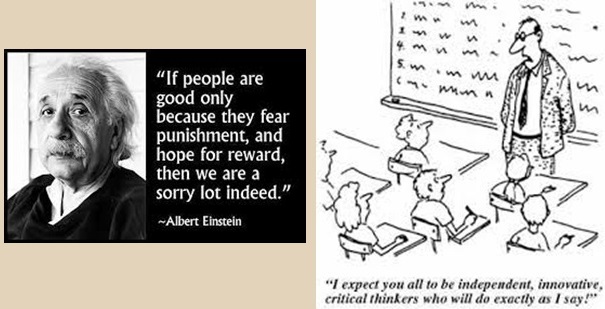
Now let us look at the nature of self-discipline…
 Discipline, either toward another or toward ourselves, (self-discipline) is the art of making a “disciple” of one’s self. The origin of the word, “disciple” means “to instruct, to teach, to learn.” W. J. Bennett writes, in The Book of Virtues, “One is one’s own teacher, trainer, coach and ‘disciplinarian.’ It is an odd sort of relationship, paradoxical in its own way, and many of us do not handle it very well. There is much unhappiness and personal distress in the world because of failures to control tempers, appetites, passions, and impulses. ‘Oh, if only I had stopped myself’ is an all too familiar refrain”. In our lives, we will continually be in the process of disciplining ourselves by effectively managing our anger, our appetites, our passions, our impulses, then disciplining (teaching) ourselves (and others) by letting ourselves (and others) to experience the natural consequences of choices, the consequences that flow freely from the choices that are made. Self-discipline need not be harsh; it can take the form of a quiet resolve or determination that then directs our choices. It is exacting, but is rarely served by our being self-critical or self-denigrating. Self-discipline allows us to make use of whatever power and capabilities have been given us, to be all that we can in the service of our dreams.
Discipline, either toward another or toward ourselves, (self-discipline) is the art of making a “disciple” of one’s self. The origin of the word, “disciple” means “to instruct, to teach, to learn.” W. J. Bennett writes, in The Book of Virtues, “One is one’s own teacher, trainer, coach and ‘disciplinarian.’ It is an odd sort of relationship, paradoxical in its own way, and many of us do not handle it very well. There is much unhappiness and personal distress in the world because of failures to control tempers, appetites, passions, and impulses. ‘Oh, if only I had stopped myself’ is an all too familiar refrain”. In our lives, we will continually be in the process of disciplining ourselves by effectively managing our anger, our appetites, our passions, our impulses, then disciplining (teaching) ourselves (and others) by letting ourselves (and others) to experience the natural consequences of choices, the consequences that flow freely from the choices that are made. Self-discipline need not be harsh; it can take the form of a quiet resolve or determination that then directs our choices. It is exacting, but is rarely served by our being self-critical or self-denigrating. Self-discipline allows us to make use of whatever power and capabilities have been given us, to be all that we can in the service of our dreams.

Ask Yourself: Is it True – Good – Useful?
January 12th, 2014
In ancient Greece, Socrates was reputed to hold knowledge in high esteem. One day an acquaintance met the great philosopher and said, “Do you know what I just heard about your friend?” “Hold on a minute,” Socrates replied. “Before telling me anything I’d like you to pass a little test. It’s called the Triple Filter Test.” “Triple filter?” “That’s right,” Socrates continued.
“Before you talk to me about my friend, it might be a good idea to take a moment and filter what you’re going to say. That’s why I call it the triple filter test. The first filter is Truth. Have you made absolutely sure that what you are about to tell me is true?”

“No,” the man said, “Actually, I just heard about it and…”
“All right,” said Socrates. “So you don’t really know if it’s true or not. Now let’s try the second filter, the filter of Goodness. Is what you are about to tell me about my friend something good”

The man said, “No, on the contrary…”
“So,” Socrates continued, “you want to tell me something bad about him, but you’re not certain it’s true. You may still pass the test though, because there’s one filter left: the filter of Usefulness. Is what you want to tell me about my friend going to be useful to me?”
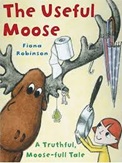
“No, not really…” the man said
“Well,” concluded Socrates, “if what you want to tell me is neither true nor good nor even useful, why tell it to me at all?
FACT and OPINION
January 9th, 2014
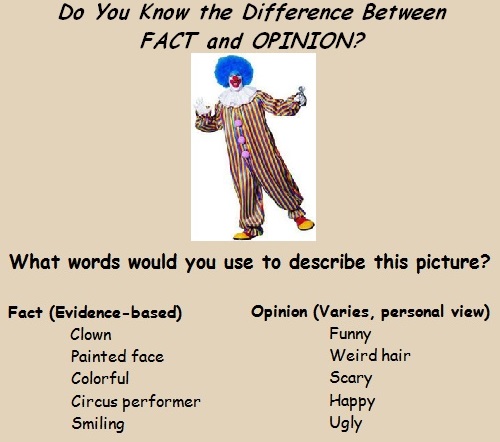
In the same way, individuals can have many varied opinions about the same event or situation. If someone we know walked past us without saying hello, we might think, “s/he deliberately ignored me,” “s/he’s being snooty and rude,” s/he didn’t want to talk to me because they don’t like me” and so on. This might lead us to feel upset, and react in ways that are unhelpful. The only fact is that the person walked past. Anything else is opinion—our own personal interpretation of the event. We don’t have any facts or know the reality of why that happened unless we ask them. We could just as well think, “maybe they didn’t see me,” “maybe they were worrying about something.” Those are more positive thoughts—but they are still a personal interpretation of the event. Realizing that many thoughts are opinion rather than fact makes it less likely that we’ll be distressed by them, and more able to make wise and calm decisions about what the best action is to take.
Get into the habit of asking yourself: FACT or OPINION?
Perfectionism vs Excellence
January 9th, 2014

Do you understand the difference between striving for excellence and striving for perfection? Let’s look at what these two very different concepts mean.
Perfection is striving for something that doesn’t exist. Because it doesn’t exist, it’s unattainable, and you’ll always be left feeling lack and as though you’re not good enough. When you think about it, what do we have that’s actually perfect? We often refer to something like “the perfect day” because we FEEL a certain way, but in and of itself, the actual day was not perfect.
Excellence, on the other hand, does exist. Striving for excellence means striving for YOUR personal best. It is a healthy mentality of wanting to improve that which is in your life that is not working while, at the same time, celebrating what is.
As you know, your body talks some serious wisdom and never lies. Notice how perfection and excellence feel in your body. When you are excelling at something, you feel relaxed, expansive, receptive, and accomplished. When you are striving to be perfect, you feel stress, tightness, constriction, and defeated. (Author: Teri Cole)

Perfectionism is the individual’s belief that he or she must be perfect to be acceptable. Perfectionism is black and white with no gray area. Anything other than perfect is failure. Perfectionism is an attitude, not necessarily a behavior. In other words, two people can engage in the same behavior such as trying to win an Olympic gold medal but one can be pursuing excellence and the other is demanding perfection. The difference lies in the thought process about the goal or behavior, not in the goal or behavior itself.
Excellence is the pursuit of excellence is the desire to attain a goal of excellence, to achieve at a high level, to be the best that one can be but without the demand attached to the goal or desire. Pursuing excellence may require tremendous effort and focus as well as other resources. But, unlike perfectionism, it does not demand a sacrifice of self-esteem, as it tends to focus on the process of achievement rather than the outcome. (Author: Monica Frank, Ph.D.)
Perfection vs. Excellence
Add any more comparisons in the empty boxes below, or use a blank sheet to create your own comparison table.
